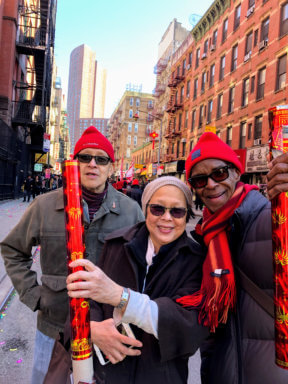After Ratty Year, Jamaican Chinese ponder ‘Year of the Ox’

Traditionally, Pam Lee, a Chinatown resident celebrates the 15-day tradition related to a new year by inviting some of her immigrant friends from Jamaica to share in the customary gifting of red envelopes, watching Dragon Parades, and dining on dim sum dishes.
Each year she delights in showing appreciation to children and workers by stuffing the envelopes with cash.
She relishes the choices of foods prepared for the annual.
And annually revels with drummers and dancers who meander through the tiny walkways named Canal, Bayard, Mott and Mulberry streets.
Unfortunately, last year, 2020 started off with tragedy from a fire at a Mulberry St. museum just across from her home. The blaze accounted for the loss of more than 85,000 artifacts alleged to have archived Chinese migration to America.
The inferno felt like devastation to the Jamaican Chinese immigrant.
She had anticipated good fortune in the Year of the Rat.
But the bad start was only a signal of worst travesties to come.
Less than a month later, there were reports of a mysterious virus that infected an individual in San Francisco.
Lee was concerned.
Her daughter Robyn resided in the vicinity.
After marrying she moved to the west coast and was pregnant with her first child.
Lee pondered postponing invitations to her friends.
An accomplished artist, the longtime resident of the close-knit Southeastern Asian community, Lee was born in Kingston but since migrating Chinatown has been her home.
By March she said she started hearing anti-Asian comments from the White House.
“He (Pres. Donald Trump) kept referring to it as the China virus,” Lee said.
Scientifically known as COVID-19, the coronavirus had reached past the Frisco Bay of California, and quickly reputed New York for being “the epicenter of the virus.”
Mounting daily casualties merited presidential attention, a task force and press conferences to update the nation.
“He called it the Wuhan virus…he said it was the China virus and his words affected tourism.”
“The more he repeated it the more China Town became a ghost town.”
Lee bemoaned the racist and xenophobic references to her people.
“It is so sad,” she said.
Lee was not the only one who heard damning references from the White House.
Social media buzzed to resonate on tourists and shoppers who usually flock to the self-contained community in order to visit museums, schools, theaters, movie houses, souvenir shops, restaurants, hotels, spas, banks and must-see attractions.
Home to almost one million Asians from Korea, Japan, Viet Nam, the Philippines, Cuba and a myriad of nations, the area located adjacent to Little Italy represents the largest of nine outposts dedicated to selling oriental novelties.
By March 2020, a mandatory shutdown forced the closing of shops, salons, banks, movie houses, novelty stores and other establishments. As a matter of fact, March 10, a week earlier than the mandated New York shutdown, Jing Fong, the largest Chinese restaurant in Manhattan was forced to close.
Truman Lam, the manager said diminished tourism was the cause of the premature closure then.
Lam explained that on an occasion he counted 36 customers in the 794 capacity banquet room.
In April, the once vibrant Asian community resembled the “ghost-town” the former president described the entire NYC.
“I really miss going to the bakery,” Sonia Chin, a Brooklyn resident and Jamaican-Chinese said.
“I used to go to China Town to buy custard desserts, coconut rolls, sugar buns, and bread.”
In addition to shopping for baked goods, Chin said she often stopped at the fruit market at Mulberry and Mott streets to pick up hard to find fruits from her Caribbean homeland.
“I could always get jack fruit, sweet sop and sour sop, tofu, star apple and other Jamaican stuff.”
Born in Spanish Town, Jamaica, Chin laments the regular trips she is deprived of making across the Brooklyn Bridge in order to replenish her culinary needs.
Prior to the pandemic, Lee and her husband Tom often invited Jamaicans — Earl Chin, Marcha Tracey, yours truly and Richard Hoyen — to experience the revelry.
A few years ago, Hoyen and Lee connected with hundreds of Chinese-Jamaicans to celebrate the Hakka Chinese migration from China to Jamaica.
Musician Byron Lee was honored then by Patricia Chin whose legacy of helming VP Records is indelible.
Hoyen was a frequent shopper in Chinatown, on any given weekend he traveled from the Bronx to buy lychee, fresh fish, vegetables and fruits native to Thailand and Malaysia.
He was an active member of the Jamaica Progressive League, a beloved colleague and avowed advocate of Socialism.
Hoyen’s choice candidate for president was Sen. Bernie Sanders.
The year New York voted to elect a mayor Hoyen’s hope was that Taiwan-born John Liu would be elected the first Asian American mayor of NYC.
Sadly, in the year of the Rat, April 2020 Hoyen died.
His untimely death still resonates with disbelief.
The China Town locale is also a hub for Earl Chin, a Jamaican Chinese who was born in in the parish of Portland. Throughout the years he has relied on the accessibility to homeopathic herbal products he claims unique to community.
From Tiger Balm to roots remedies Chin is known to stock his home with tinctures and liniments he is convinced provide ‘irie’ cure to his ailments.
Separate from restrictions caused by the pandemic, Lee is also disheartened by the slew of anti-Asian attacks that have emerged throughout the nation.
NYPD Commissioner Dermott Shea reported a 1,900 percent spike in random assaults on elders and helpless Asians.
Last week in Flushing, Queens an Asian woman was pushed onto the pavement by a thug. She received lacerations to her head from being thrown against metal newspaper containers.
Mayor Bill de Blasio assailed the perpetrator citing xenophobia against Asians.
The same week, operators of Jing Fong, the Elizabeth St. Chinese restaurant announced they would close permanently on March 7.
The reason given for the closure of the popular eatery was “racism and xenophobia.”
Of this year’s celebration of the Year of the Ox Lee described the muted celebration as being “uneventful.”
“With no dragon parades, tourists… you wouldn’t know it was New Year’s,” Lee said.
Despite desperate conditions, loss of her tenants and exiled neighbors who were unable to pay high rental fees, Lee said she is optimistic.
On Feb. 12 she extended the usual “Gong Hay Fat Choy!” wishes for “a happy New Year” in 2021.
Added to that, she hopes that later in the Year of the Ox she will be able travel to the west coast to see her first grandchild.
Catch You On The Inside!
The post After Ratty Year, Jamaican Chinese ponder ‘Year of the Ox’ appeared first on Caribbean Life News.





